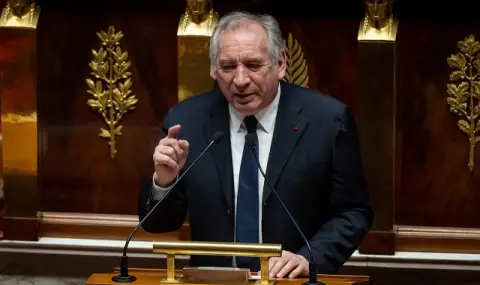Prime Minister François Bayrou survived two no-confidence votes yesterday, including over France's budget, which was adopted in the National Assembly (lower house of parliament), thanks to the neutrality of the Socialists, AFP reported.
France is in a difficult economic situation due to its record public debt and is going through political instability after the dissolution of the National Assembly in early June 2024 by President Emmanuel Macron. This happened after the defeat of his party in the European Parliament elections. Since then, the parliament has been divided into three blocs (left, center, and far-right), none of which has a majority.
The National Assembly considered and rejected the first vote of no confidence, proposed by the radical left "France Insubordinate", supported by the communists and environmentalists, against François Bayrou's decision to pass the 2025 draft budget without a vote.
Only 128 deputies supported the vote of no confidence, and 289 votes were needed to bring down the government.
Later in the evening, the National Assembly rejected a second vote of no confidence, this time related to part of the 2025 social security budget. He won just 122 votes.
The budget row rocked markets and brought down the government of Bayrou's predecessor, Michel Barnier, after just three months in office. Bayrou's government, in turn, survived by making major concessions to the left and far right to advance its legislative agenda, Reuters reported.
"This budget is not perfect. "It is an urgent step because our country cannot live without a budget," Bayrou told lawmakers.
Meanwhile, Finance Minister Eric Lombard said the failure of the opposition's attempt to topple the government with a vote of no confidence was a good thing for France.
The government's aim is to reduce the budget deficit to 5.4% of GDP, which will be achieved by introducing new revenues through exceptional tax contributions from wealthy households and large companies, but will also require cuts in spending by several ministries.
France's deficit reached 6.1% in 2024, the worst result among European Union countries, with the exception of Romania, well above the 3% limit allowed by European Union rules.
Yesterday's vote allowed the National Assembly to adopt the draft budget for 2025. The Senate (upper house) will rule on the matter today, and this vote will most likely lead to the final adoption of the text by the French parliament.
The Socialist Party and the far-right "National Rally" groups announced that they would not support the vote of no confidence in the name of the country's stability.
Introducing the motion for a vote of no confidence, "France Insubordinate" MP Aurelie Trouvet criticized "the biggest spending cuts that France has experienced in the last 25 years", calling the budget "the most austere of the 21st century".
Socialist MP Emmanuel Grégoire was booed by MPs from the radical left. He said that the Socialist vote "does not mean consent" with François Bayrou's policies and confirmed that the party would table another vote of no confidence at the end of the budget debates, concerning "his entire policy".
The Socialists announced that they would table this vote in response to the "Trumpification of the public debate", especially after François Bayrou's statements about the "feeling of being flooded" by migrants.
National Assembly deputy Joan Gillet was critical of the budget, which provides for "an increase in the tax burden", but his party did not support the vote of no confidence.
Minister of Public Finance Amélie de Montchalin promised to strictly monitor "the implementation of the budget" in 2025 with the aim of "achieving the 5.4% target" and to learn "lessons from what happened last year", when the executive branch allowed the deficit to spiral out of control.
The French government is arguing that the country needs a working budget at a time when US President Donald Trump is threatening new tariffs on the EU and Russia is gaining more confidence in Ukraine, the AP notes.
